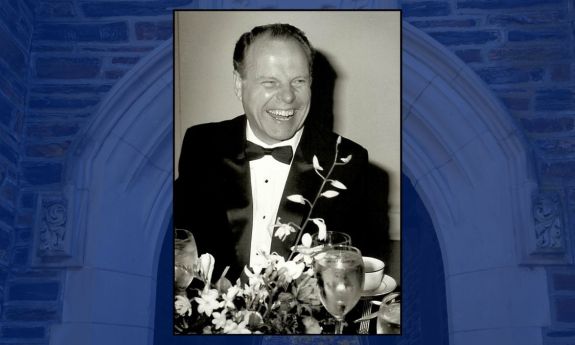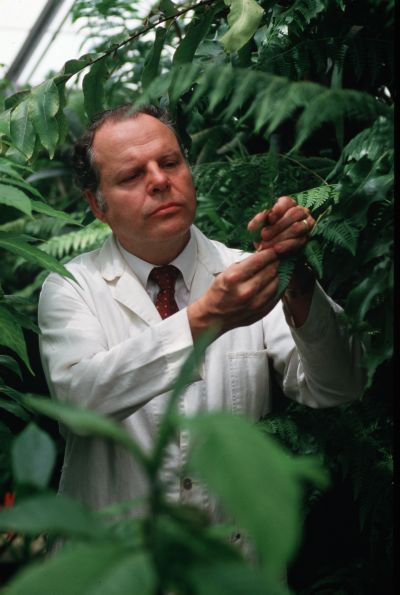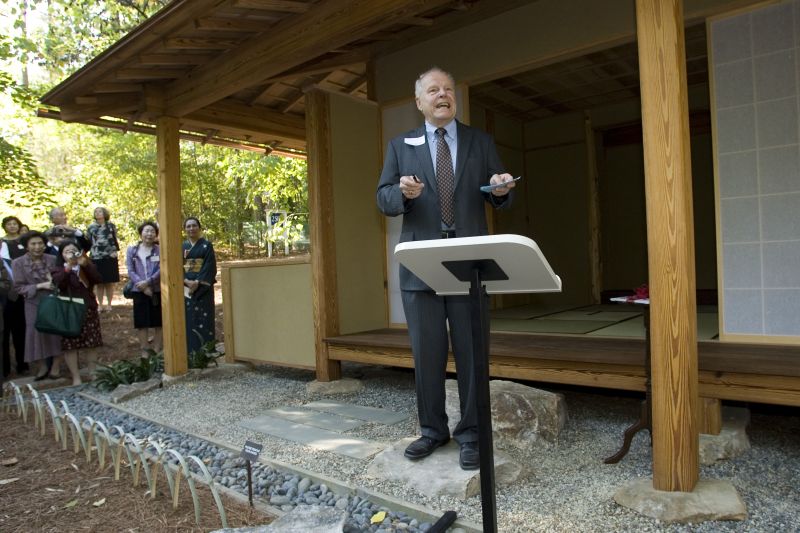Richard White, Former Trinity College Dean, Dies
As dean of Trinity College, White helped advance undergraduate education

During his tenure, he strengthened the undergraduate curriculum and played a key part in Duke’s rise of national and international reputation for undergraduate education. He oversaw significant investments in the humanities that attracted top faculty and students, made hirings through the university’s first Black faculty initiative, supported interdisciplinary efforts that created collaborations across the campus and helped expand Duke’s global learning programs.
These efforts changed Duke and especially Trinity College of Arts and Sciences, promoting excellence and making it more inclusive in its demographics and in its scholarship and learning.
“Dick White was one of the pillars of Duke for decades – a stalwart dean and a superb colleague,” said former Duke President Nannerl Keohane, who worked with White. "Both his colleagues and students over the years found him a source of wisdom and affectionate support. We are lucky to have been part of his Duke University."

“I had the honor of knowing Dick as a friend, a fellow dean, and a brilliant colleague who helped make Duke a stellar university,” said William Chafe, who succeeded him first as dean of the faculty of arts and sciences and then as Trinity College dean. “He was my dean when I served as chair of the history department, and a terrific ally in helping to make ours a top department at Duke.
“Then, when I became dean of the faculty of arts and sciences, I worked in even closer partnership with Dick where for a decade, we collaborated to develop Curriculum 2000 and elevate Duke to its current stature as one of the top universities in America. With a remarkable sense of humor, and a terrific ability to reach out to colleagues, Dick White was one of the people who contributed most to Duke becoming what it is today!”
An award-winning teacher, White was a mentor to numerous young scholars throughout his Duke career, including after he took on emeritus status. As word of White’s death was shared this week, several students began sharing stories with colleagues at Duke.
Tzu-Tong Kao, who earned his Ph.D. in biology at Duke, described the environment White created in his lab.
"Dick was my committee member, and much of my Ph.D. research on plant anatomy was conducted in his lab,” said Kao, who is now a professor of biological sciences at National Sun Yat-sen University in Taiwan. “By the time I joined Duke Biology in 2013, he was already a professor emeritus of botany. His lab, tucked away in the basement of the biology building, was small and cozy, lined with books and instruments essential to plant anatomy, like microscopes and microtomes. The lab had a distinctive scent—a blend of heated paraffin wax, wood and alcoholic chemicals—that reflected the years of meticulous plant anatomical research carried out there.
“Dick was not only a brilliant scientist but also a kind and gentle mentor. Every time I discussed my research with him, he would carefully review my plant anatomy figures, offering thoughtful suggestions on directions worth exploring further. His guidance was invaluable to me.”
After leaving the deanship, White continued to hold leadership roles at Duke. In 1999, he became director of Sarah P. Duke Gardens, leading the effort to make the Doris Duke Center a reality, while continuing the gardens’ development as a valuable contributor to both Duke and the wider community. White served as director until 2007, when the university hired Bill LeFevre as the gardens’ first full-time executive director.
“Dick White played a leading role in the development of Sarah P. Duke Gardens long before he followed Bill Culberson as director and continued to do so long after as a friend and mentor,” said LeFevre, the gardens’ executive director.
“I will especially miss our weekly chats when he would stop by my office to borrow a coffee mug before his Thursday afternoon volunteer shift. This gentle man, who always had a smile on his face and cut such a regal figure carrying the mace as university marshal, was a giant at Duke University for more than half of its first hundred years.”

In 2000, as university marshal, White supervised events from Founders Day to commencement. He also returned to teaching botany. The departments of botany and zoology merged in 2000 to form the unified Department of Biology.
In 2001, the university opened the Richard White Lecture Hall, the largest classroom lecture hall on East Campus, a symbol of his dedication to undergraduate education.
In 2005, he was named the University Distinguished Service Professor Emeritus of Botany.
While he was honored to have a building named after him, after his retirement in 2005 he was also “quite comfortable staffing the information desk at the Doris Duke Center,” said Sue Wasiolek, who as dean of students regularly worked with White. “He was proud but humble.”
White was also a volunteer in local affairs and was active in such groups as Sister Cities International of Durham, the Senior Tar Heel Legislature and the Orange County Advisory Board on Aging, among other groups. His leisure activities included listening to classical music, reading and enjoying the pond and woods surrounding his home, from the deck of the house the family lived in for more than 50 years in rural Orange County.
He is survived by his wife of 59 years, Norma; his sister Marilyn Lechler; three children, Richard (Sandi) White, Karen (Wade) White-Tong and Susan (Brian Smith) White; four grandchildren, Hannah White, Mason and Spencer Smith and Alexandra Tong; and three step-grandchildren, Taylor Penn, Tori Penn and Wade Penn.
No memorial service is planned. In a private ceremony with immediate family and close friends, Richard White’s ashes will be buried in the Memorial Garden at Sarah P. Duke Gardens. An open reception will be available after the private ceremony at the Gardens, but details are not yet available and will be shared at a later date. Gifts in his memory can be made to Trinity College of Arts and Sciences at Duke University; Duke University Chapel; and Sarah P. Duke Gardens.